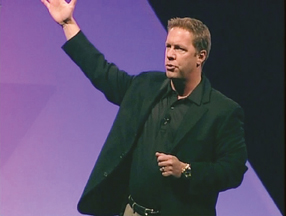In marketing, one definition of “brand loyalty” is a consumer’s commitment to repurchase or otherwise continue using a brand that’s demonstrated by repeated buying of a product or service or other positive behaviors such as word of mouth advocacy.*

Put the right price on a product and anyone can sell anything to anybody — once. That doesn't create loyalty. It tells the customer he got a great deal," says Scott Deming.
Defining brand loyalty is easy. Making it happen is another matter altogether.
During the Farm Equipment Manufacturer’s Assn. meeting last fall in Dallas, one of the speakers told the audience that if they wanted farmers to be loyal to their equipment brands, their salespeople needed to stop focusing on the features and benefits of the products they were selling.
That speaker was Scott Deming, a professional speaker, trainer, author and president of Scott Deming’s ESP. In 2003, he sold Ryan Communications, a multi-million dollar, multi-office advertising and marketing agency, and began training companies how to How to create sustainable success and build cult-like brands.
Among his clients have been at least two of the major farm equipment manufacturers along with some of the biggest worldwide seed and fertilizer companies. “I understand the ag business and the distribution channel from manufacturer through the dealer,” he says.
In a follow-up telephone conversation with Deming, I posed a comment and a question: “Any good sales person knows that customers need and want to know about the features and benefits of a product, right?”
“Everybody thinks it’s all about features, benefits and the contract,” he says. “It’s not.”
To demonstrate his point, Deming told of a project he worked on with the seed division of a major ag-based company. “All they talked about was price. They believed if their seed was 50 cents a bushel higher than the competitors, they would lose a lot of business.”
Deming began calling farmers to get their feedback, and recalls a conversation with one producer that tells the real story of brand loyalty.
“This farmer had been with the same salesperson for several years even while she moved to three different companies. She worked closely with this farmer and his family, and he said, ‘I would never throw her under the bus for 50 cents a bushel.’
“I asked him, what would be the one thing — if there was one thing — that would cause you to move all of your business to the company I’m working with?
“He said, ‘I’ve been doing this for a long time. If somebody from your company came into my house and sat down with my wife and me, and asked what would it take to make my family life better, not just my farm; if they showed how me their product would allow me to spend more time with my family, take some vacations and make enough money so I can do what I want to do, that’s the company I’m going with.
“‘But all they do is talk about price per bushel and fertilizer here and fertilizer there. I want someone to help solve my problems. Those are people I want to work with.’”
With that, Deming says, “They weren’t focusing at all on culture and service and customer experience. Starbucks didn’t become what it is because of its coffee. In fact, its coffee is rated third best behind Dunkin’ Donuts and McDonald’s. It’s the experience of going into a Starbucks that made them money. They charge more because people are willing to pay for the experience.
“If all you do is market the brand that you’re selling and focus on the stuff that you sell, you have commoditized yourself right along with your product,” Deming says. “If you put the right price on it, anybody can sell anything to anybody — once. That doesn’t create loyalty. All it does is tell the customer he got a great deal.
“The fact is I can get your stuff anywhere. As a dealer, you need to figure out a way to get farmers not to remember what they bought, but to remember who they bought it from.”
While discussing the results of the Farm Equipment/Farm Progress equipment brand loyalty survey, and farmers rating “better parts availability” as their number one priority, Deming said, “You need to think through their responses.
“You need to understand, when they say ‘better parts availability,’ what that means is reliability, which means I don’t have to worry, which means I can sleep at night, which means that when I call you, I trust in my heart and soul that you’re going to be there for me.”
*Dick, Alan S. and Kunal Basu (1994), “Customer Loyalty: Toward an Integrated Conceptual Framework,” Journal of the Academy of Marketing Science, 22 (2), 99-113.



![[Technology Corner] Quantifying the Impact of a Precision Ag Pioneer](https://www.agequipmentintelligence.com/ext/resources/2024/08/23/Quantifying-the-Impact-of-a-Precision-Ag-Pioneer.png?height=290&t=1724422794&width=400)
Post a comment
Report Abusive Comment